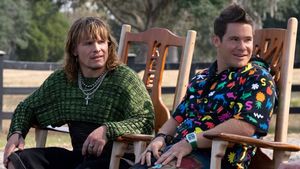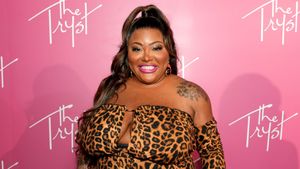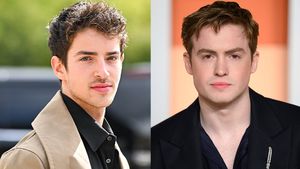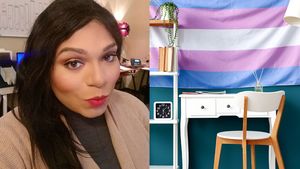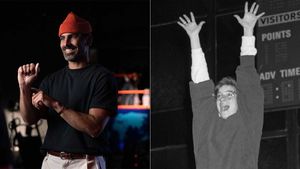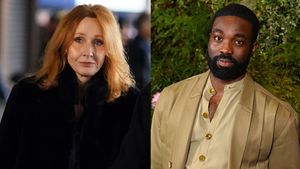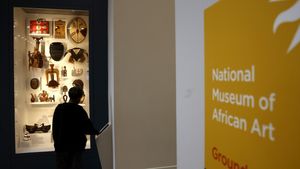It's National Coffee Day, and when you pick up your favorite blend as you walk out the door to your next meeting or as you take a minute to really enjoy the aromatic quality of that cup of joe in front of you, it might be worth spending a second thinking about the lesbians and queer women in the industry behind that bean.
Barista Drew Glucksman starts her day with a little caffeine meditation; "I begin my day with my morning coffee and it is, on a good day, my time of centering and preparation. If I am able to give someone a similarly positive experience as a visibly queer person, I'd like to think that I may be helping to shed some of the mystery behind the curtain."
The coffee industry is notoriously male-dominated, with many trends, quality control jobs, and just about every one of the most influential voices and awards in coffee being held by men. There's generally a jocular camaraderie between these men in an industry that's less respected than the restaurant or wine business, and with that kind of boy's club, or 'bro-rista', culture, it can be hard for women - let alone queer-identified women - to get taken seriously for their work and career aspirations.
There are some sobering statistics, as I've mentioned before. The minute your coffee hits your hand in the morning, you are in possession of an item that is valued higher in this country than the entire working hour that the barista in front of you earned to make it (according to national labor statistics).
But specialty coffee as we know it has a lot to thank women for. From pickers to servers, baristas, and roasters, there are a growing number of women in the industry, which makes this year the most lesbian or queer year yet for National Coffee Day! Happy day indeed!
Within the industry, the most respected voices tend to narrow to the competitive barista champions and the roasters. But when you look at the competitive part of the industry, as I've mentioned, Bitch Magazine tells us that even though female baristas who compete in regional competitions on the way to World Baristas Championships do just as well as the male baristas, they are statistically way underrepresented, meaning that only three out of the last six years of the World Barista Championships have included a woman in their list of finalists. And as the magazine points out, “The lack of women in these competitions means not only that it’s mostly male baristas representing the public image of the industry, but it’s mostly men setting the discourse for what’s important in the industry.”
Fortunately, several incredible coffee mavens happily shared their experiences with us. Their encounters as they entered the industry were often daunting.
As Talor Browne, Head Roaster at the internationally-acclaimed Tim Wendelboe in Oslo, Norway told us; "I felt incredibly unwelcome from the moment that I arrived. I never feel like I get to stop fighting for my position. I watch men start from the bottom an ascend the ranks ahead of me, regardless of skill. It can't be just a coincidence, the many years I've watched it happen. In a senior position, I feel like a rarity. But even more, I feel my position is tenuous - I expect it to be retracted every day."
Talor Browne
For Gretchen Williams, owner and roaster at Heartbreak Coffee in Long Beach, California, the story goes quite similarly. "Running a women-based business within a very 'hardcore male' specialty industry that is saturated with beards, ego, flannel and off-the-cuff service, it definitely feels like an uphill battle sometimes. Luckily though, it's what also sets me apart completely. While I've been very grateful to have gained acceptance by majority of my male peers, it doesn't go to say that I still don't stick out like a sore thumb within the roasting and production niche. I enjoy the challenge though... It's not always easy but it's part of the drive for me".
The visibility of coffee specialists is a really difficult part of the industry, for while the frontlines of barista'ing might be almost fairly female, Gretchen says, "Odds are stacked pretty high against women within the production side of the coffee industry. Being a roaster, I have only met 2 other female roasters in person... And have only read articles about one or two more. It's not to say that women aren't interested in the production side of coffee, I just don't think we have many strong, female personalities to look up to within that part of the coffee culture: it's difficult to want to climb a ladder that you might not even feel truly exists for you just yet."
Amy Callahan, who now holds a Quality Control position for the coffee roasting portion of Blue Bottle Coffee's Los Angeles arm, described her experience when she started at Stumptown Coffee, in Portland as what felt like a potential dead end for her; "There was never a single woman hired into production, roasting or quality control since they opened in 2002! I was hired as a barista in hopes that I could work my way up to roasting. 3 years later I was still a barista and needing a change".
Amy Callahan
After she moved to Los Angeles, she spent some time 'paying her dues' by coffee bagging, aiming for a roasting position. But then when her company became what is now Blue Bottle, she explained, "This was when all the doors opened for me. James Freeman, the owner, is outwardly supportive of LGBT individuals. It goes further than just being 'ok' with queer employees because he is openly supportive. On top of that, a lot of very elite and leadership based employees are women! Our head roaster is a woman as well. I knew right away that I could build a career here. The moment I felt I had finally arrived and my hard work noticed was 8 months ago when I was offered the Quality Control position for LA. I taste every batch of coffee roasted and record data to submit to the roasters and retail. It's up to me to pass or fail coffees and sample roast new coffees to find a good starting point for production." That position is a rarity, as the notoriously difficult test that is used as an industry standard for quality control is rarely taken by women in the industry because of job opportunities, time available to prep for it, and low expectations of pass rates to expenses, as well as appallingly sexist remarks that circulate through the industry about women's 'natural' abilities to taste the full range of quality and taste palates.
Amy Callahan
How are these women planning on celebrating this day? With a coffee, unsurprisingly.
"I definitely will be looking back and acknowledging how far I've come, and how far I want to go from here." says Gretchen.
And from Drew, "To celebrate National Coffee Day, I'm drinking a French press of local Kau-grown coffee in nothing but my underwear. I may get wild and pet a cat with my other hand."
Have you liked us on Facebook?































































































